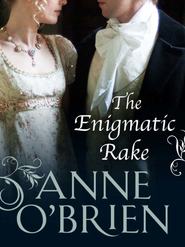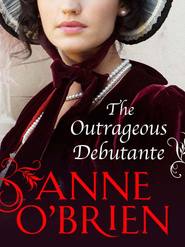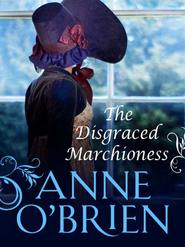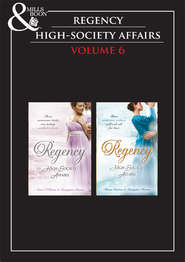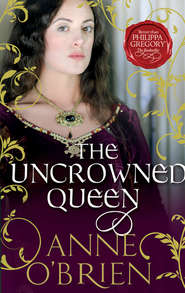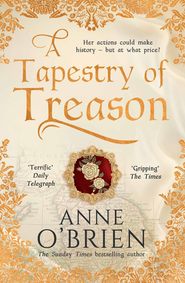По всем вопросам обращайтесь на: info@litportal.ru
(©) 2003-2025.
✖
Puritan Bride
Настройки чтения
Размер шрифта
Высота строк
Поля
Elizabeth was compelled by good sense to agree. She looked at her handsome, charming, infuriating son who resembled so closely his father. And remembered the days when, as a young girl, she had been swept off her feet to fall headlong into a love that lasted until death had parted them. What girl in her right mind would reject Marcus Oxenden? Katherine Harley would be either a fool or blind to do so.
‘Would you not consider marrying for love?’ Her suggestion, for once, was tentative. It was not, she knew, a subject open for discussion.
Marlbrooke smiled at her, making no attempt to hide the deep affection between them, understanding her anxieties. He leaned forward to bracelet her wrists in a light clasp. ‘It may not be. I know that you adored my father. And he you. But such a blessing is not for everyone. I do not look for love in marriage. Merely respect, friendship if we are fortunate—tolerance if we are not. I believe that Katherine Harley will be more than suitable as a wife. Now, let that be an end to it. There is no need for your concern.’
Elizabeth sighed, but accepted from experience that there was no good to be had in pursuing the matter further.
‘Be kind to her, Marcus,’ was the only comment she allowed herself to make. ‘Her childhood can not have been quite comfortable. And tell her … tell her that I will welcome her here as my daughter.’
‘I will.’ She instantly knew that she had touched a nerve. His tone took on a sardonic note. ‘Many would tell you that I have no such finer motives, but whatever they might say about my character, it is not my intention to be cruel to her.’
‘I know all about your character! I would not accuse you of such things!’
He showed his teeth at her response. ‘But you are biased, my love.’ Then made her smile again as he raised her hands to his lips and kissed them lavishly.
‘Just try not to overawe the poor child.’
‘It was not my intention.’
‘No. But it would be so very easy for you to do.’
‘I will do my poor best. Nor is it my intention to punish her for past sins. So don’t fret.’
‘Very well.’ And that was as far as Lady Elizabeth dare push the issue. She stood and made her way slowly towards the door, now followed by Marlbrooke.
‘So, madam. What shall I bring you from the flesh pots of London?’
‘Anything?’
‘Anything your heart desires.’
A bride with whom you have fallen hopelessly in love and who will love you in return. ‘Books, if you will. Poetry. Whatever is fashionable.’
‘Whatever I think Felicity will dislike?’
‘You are too astute for your own good.’ Elizabeth chuckled, allowing her hand to rest for a brief moment on her son’s shoulder, smoothing the dense nap of his velvet coat.
‘I will do it, with much pleasure.’ He bent to kiss her cheek.
‘Take care, Marcus.’
‘Of course.’
And he was gone, leaving her to worry over a proposed marriage that had such cold expectations. A suitable wife, indeed! It seemed to her to be damned before it had even begun.
And now, a week after Marlbrooke’s departure, Elizabeth Oxenden made her way slowly and painfully through the Great Hall in the oldest part of Winteringham Priory. She leaned heavily on a cane, her knuckles white with the effort and her lips compressed into a firm line. Today she felt every one of her forty-eight years. It had been a long winter. Every joint and muscle ached with the persistent damp and cold. The flaring agony in her left hip caused her to limp heavily and doubt that she could reach the distant doorway without aid.
How embarrassing! It seemed such a short time ago that she had been able to ride with her husband, to dance until the candles guttered, to play in the Long Gallery with her boisterous son. She paused to rest against the heavy oak table. Her skin was still soft and clear, her eyes arresting with green flecks in their luminous grey depths, all remnants of her earlier beauty. But pain had left its imprint, strain had touched and deepened the lines around mouth and eyes. She felt so tired. Elizabeth sniffed in an instant of weakness and self-pity and tears threatened to spill from her eyes.
But self-pity was not in her nature. She would not call for Felicity. She straightened her spine and continued her clumsy route, surveying the heavy linenfold panelling and oak floorboards that stretched before her. They looked polished and well cared for to her critical eye. She did not to any degree dislike the house. She simply wished that she was not there. She would much rather be in London where her home was familiar, far smaller without the inconvenience of long corridors and vaulted ceilings and so, of course, much easier to heat and eradicate draughts. Where friends came to visit and cheer her through the dark winter days, where there were shops, and companions and entertainments now that the King had come into his own and made it clear that he intended to rejoice in his new powers.
Her own house in the country—not this one, but Glasbury Old Hall—had been destroyed in the war, razed to the ground after a year of bitter and violent siege in 1643. All her furniture gone, her treasures and her comforts, everything but the most personal of possessions, which they had managed to carry away in a night of frenzied packing and flight.
As for this house, Winteringham Priory, her husband had valued it greatly as an object of conquest. He had wrested it from the Harleys and taken it for his own in the same year that they had lost their own home. Sir Thomas Harley had been absent with the Parliamentarian army and his wife Philippa did not possess the backbone to withstand the siege as some beleaguered wives had done. And then Sir Thomas had been killed at Naseby—so young, such a waste … And so Elizabeth had come to live here, comfortably enough, if a little shadowed with guilt. It had seemed like justice, she supposed—if she could close her mind to the fate of Lady Philippa and the baby. But everything had changed so quickly. The house had been confiscated by Parliament under the authority of the Rump after the execution of the old King. And John, her beloved John, was now dead. Memories were too painful and Elizabeth would not willingly have returned to the Priory, no matter how magnificent its rooms, how valuable the estate.
But since King Charles had seen fit to gift the Priory to her son rather than the Harleys, here she was, uprooted from London and restored to this place of edgy memories and icy draughts. She winced and gasped in pain as she had to pull with some force to open the door from the Great Hall to the kitchen regions. It should please her that her son had the ear of the King, she mused as she rested again on a convenient window seat. But she wished he was here with her now, rather than indulging himself in the dubious pleasures of the Royal Court. Not that it was any hardship to him, to immerse himself in Court life, if rumour did not lie. Drink, cards, women, all the delights of the flesh—John would turn in his grave if he knew what Marcus was about. And if she remonstrated with her son, the love of her life, he merely smiled that particularly charming smile, his eyes warming his handsome but frequently unnervingly austere features, assuring her that there was nothing for her to be concerned over.
Raindrops ran down the window with icy monotony, blurring Elizabeth’s view of the formal garden and the distant skyline. She knew the landscape well, of course, had always known it. After all, the outer reaches of the Priory ran with the Old Hall on its western side. Once, before the war, their families had been close neighbours, friends even, enjoying each other’s company in hunting and evenings at home. She remembered Lady Philippa Harley, a gentle girl, perhaps a little weak, always afraid of criticism from those around her and with no real interest in the world-shaking events taking place in London and nearer to home. But pleasant enough for two young women to exchange girlish gossip. So how had it come to this—death and division between neighbours who once bought christening gifts for each other’s children? The War had a lot to answer for, and here they were, back with a King and Parliament, irrespective of the death of John, and of Sir Thomas.
The voice of Felicity interrupted her thoughts as it echoed along one of the corridors above, querulous and harsh in complaint against some hapless servant. Elizabeth struggled to her feet to make good her escape before she could be discovered. Felicity was not the most amenable companion in the world, but without doubt she needed someone. Some days she could hardly lift her arm to brush her own hair. Or even push herself out of bed. The fear of increasing pain, of growing dependence, gripped her with sharp talons. Oh, Marcus! Let me go back to London where it is easier to forget my infirmities, where I am rarely lonely. She knew that she would never say those words to him. He would listen and try to make life more comfortable for her, but he was determined to make his home here at the Priory and she knew better than to voice her dissatisfaction. She understood the loss in his life, the devastation, the driving force within him, and loved him far too much to stand in his way.
She struggled through the doorway to avoid Felicity’s approach, and turned into the passageway to the kitchens. As for this marriage … Elizabeth pursed her lips thoughtfully. She could understand only too well the logic of her son’s decision. Katherine Harley was the true heiress to the property, even if her inheritance had been overlooked in the present political climate. It would certainly consolidate her son’s possession, not that he needed it with the courts and the King’s pleasure behind him. But marriage … How old would she be? About twenty years? Elizabeth vaguely remembered the birth of the baby just before Sir Thomas had died. A babe in arms when Philippa had been driven from the Priory to take refuge with Sir Henry Jessop, her brother over at Downham Manor. What sort of upbringing would the child have had there? Little warmth and pleasure, Elizabeth imagined. Sir Henry had a name for staunch Puritanism, even though he might be a fair man. And Philippa would probably not stand against him in the matter of the upbringing of her child.
But nothing was settled as yet. It was all still in the hands of the lawyers. And what would the girl make of her profligate son? A slow smile eased the tension of Elizabeth’s face at the prospect. Perhaps Katherine Harley would be a true daughter to her, to replace the still-born child she still mourned after all these years. But what if she was a hymn-singing, Bible-reading girl, all duty and service with no love of music and pretty clothes? She shuddered at the prospect. Not all the legal intricacies would make her a suitable wife and daughter, whatever her promise to Marcus.
She hesitated outside the kitchen door and would have retreated if she had not experienced a particularly sharp twinge of pain from her hip to her knee. Did she really want to enter Mistress Neale’s domain? She was pleasant enough, a sturdy, capable body, elderly now but still able to run the household efficiently, but she was an old family retainer of the Harleys who had stayed put through all the upheavals and changes of ownership, like Master Verzons, the steward. Always polite. Always co-operative. But Elizabeth felt that, as a newcomer, a usurper in fact, she was an intruder. They could run the house and did not need or desire orders from her. They smiled. They showed all due respect. But she sometimes caught a gleam in Mistress Neale’s eyes—not unwelcoming, exactly, but assessing, even after all these years.
There was no help for it—she could not stand here for ever in this draughty corridor. She pushed open the kitchen door.
‘Good morning, my lady. Can I be of any help?’ Mistress Neale broke off her conversation with the cook, wiped her hands on her apron and approached with a quick curtsy and a calm welcome. The kitchen was warm, a blessing to Elizabeth’s chilled flesh, and hummed with well-ordered activity. Something fragrant steamed over the fire. Lady Oxenden would have liked nothing better than to sit and exchange news and gossip with her housekeeper.
‘Why, no. I thought …’ Why did she feel so inadequate? ‘I might take a look at the still-room.’ And Felicity will not find me in there! ‘I do not have the key. Perhaps you have it, Mistress Neale?’
‘Indeed, my lady.’ She took a ring of keys from her belt and selected the appropriate one. ‘Was there anything in particular you were needing? I can always send Elspeth.’
‘No, indeed. I am sure you have an inventory, but I would like to see what is still of use. I doubt that anything has been bottled or stored for a good number of years.’
‘No, my lady. It has been sadly neglected since the house has stood empty. My own preserves are kept here in the kitchen larders. Mistress Adams never used the still-room—she thought it too small and inconvenient for the storing and drying of herbs—and she had no interest in preserves.’
‘No. I do not suppose she had.’ Elizabeth sighed and avoided the opportunity to discuss the likes and dislikes of Mistress Gilliver Adams. Some of them were most disturbing and did not bear close contemplation.
She took the key and, since there was no forthcoming invitation to stay in her own kitchen, she closed the door quietly and retreated.
A blind passage led off from the corridor to the still-room. With stiff fingers Elizabeth applied the key and found to her relief that the lock had received some recent care and opened smoothly. The door allowed her entrance to a small room, lined with shelves from floor to ceiling, with a work bench along one wall and an old cabinet fixed to the wall in one corner. The only window was small, mullioned, letting in a poor, grey light. How long since anyone had ventured in here? she wondered. Dust and cobwebs covered and draped from every surface, as did the spiders, and she tried not to notice the mouse droppings along the surface of the bench.
For the most part the shelves were empty, but there were a few jars at one side, some with faded labels, most without. Elizabeth remembered enjoying this little space in happier days to store the products of the kitchen garden and the orchard for the onset of winter. Presumably it had not been made use of any time in the past decade. Above her head hung bunches of herbs, perhaps collected and put there by herself. They were dry and brittle now, too dusty for use, but the scent of sage filled the air as she crumbled a sprig in her hand and allowed the leaves to drift to the floor. She had seen that the herb garden was totally overgrown, but it would be pleasurable to resurrect it on warm afternoons in spring—if she could find it physically possible.
The bottles had dark, sinister contents. Possibly plums … or damsons—she remembered a particularly fine specimen by the wall in the kitchen garden. She would not care to risk sampling them after all these years. Perhaps she could get Felicity to help her take stock and clear out. It would give her something to do other than complain and read pious passages from her limited collection of books. Her eyes closed, the aromas of herbs around her, Lady Elizabeth wished with all her heart that she had her health back.
Finally Elizabeth opened the cabinet. On one shelf was a pestle and mortar. Beside it a sheaf of yellowed pages, perhaps a collection of old recipes, but nothing she remembered. Otherwise there was a general clutter of spoons, dishes and a cracked glass container.
She was about to turn away, somewhat disappointed at the cabinet’s meagre treasure, when it caught her eye, tucked into the bottom corner of the cabinet. It was a handsome pottery jug, quite old, undecorated and cloaked with dust, but with an elegant neck and handle. She had no recollection of this. There was no label that she could see, so she bent carefully to lift it out and place it on the bench. It was well sealed with wax and there were traces of an official seal stamped into it, but it was brittle enough to begin to disintegrate at her touch. She carried it to the window to squint at the imprint. Impossible to tell. She moved to replace it in the cupboard. Perhaps Mistress Neale would know more about it.
Felicity’s voice calling her name from close at hand caught her attention. It was enough to herald disaster. She fumbled, the pottery too smooth in her grasp and her swollen knuckles unable to keep a firm pressure.
She dropped the pot. It shattered on the tiled floor at her feet, sending shards of painted clay in every direction.
Elizabeth groaned in frustration and self-disgust. Now she would have to clear it up, whatever mess it contained—apart from having wilfully destroyed a handsome jug. Relief and some surprise swept through her, however, when she realised that, in spite of the stopper and the seal, the jug was, in fact, empty. All she could see around her feet were broken pieces of pottery.






